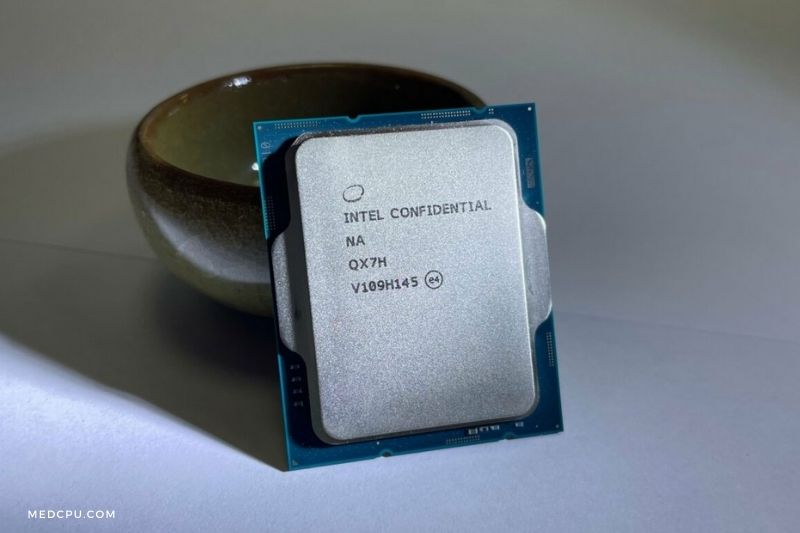Intel’s Core i9 line is finally here, with the first of many models released as of late. The new Core i9 12900K is a popular choice for gamers. Video editors want to maximize performance and speed, and users will find that the Core i9 12900K handles any process or application quickly and efficiently with Intel’s new Zen 2 architecture.
Read on our guide for full details about the new Intel Core i9 12900K review, plus the other models in Intel’s Core i9 lineup.
Intel Core i9 12900K Overview
Core i9 12900K is the most powerful of Intel’s desktop 12th Generation processors. It houses the Alder Lake architecture in its most efficient form. This means more cores, faster speeds, and greater bandwidth. But if you look beneath the surface, you will find a completely new chip architecture.
Frame rates, OS requirements, idiosyncrasies, and OS requirements are all part of this. This makes for a fascinating analysis.
Pros:
- Amazing single-threaded performance
- Multithreaded multithreading capabilities significantly improved.
- Intel’s Core CPUs make a big leap.
- The best desktop platform available with DDR5 support and PCIe 2.0 support
Cons:
- Alder Lake is not compatible with some games yet.
- High power consumption
- Launch costs for platforms could be high
Specs
Cores (P+E): 8+8
Threads: 24
L3 Cache (Smart Cache): 30MB
L2 Cache: 14MB
Max P-core Turbo frequency (GHz): 5.2
Max E-core Turbo frequency (GHz): 3.9
P-core base frequency (GHz): 3.2
E-core base frequency (GHz): 2.4
Unlocked: Yes
Graphics: UHD Graphics 770
Memory support (up to): DDR5 4800MT/s, DDR4 3200MT/s
Processor Base Power (W): 125
Maximum Turbo Power (W): 241
Recommended customer price: $589–599
Retail price (boxed, Newegg/Overclockers): $649.99/£599.99
Performance
Intel promised a huge leap forward with Alder Lake. Based on my tests, the Core i9-12900K was delivered. During my tests, one thing was clear: Intel can deliver the same 16 core performance as the AMD Ryzen 9 5595X, at half the price and half the cores running at maximum power.
| Intel Core i9-12900K | AMD Ryzen 9 5950X | Intel Core i9-10900K | |
| Cinebench R23 single-core | 1,989 | 1,531 | 1,291 |
| Cinebench R23 multi-core | 27,344 | 27,328 | 13,614 |
| Geekbench 5 single-core | 2,036 | 1,726 | 1,362 |
| Geekbench 5 multi-core | 18,259 | 14,239 | 10,715 |
| PC Mark 10 | 9,092 | 8,254 | 7,593 |
| Handbrake (seconds, lower is better) | 47 | 58 | 72 |
| Pugetbench for Premiere Pro | 1,066 | 992 | 855 |
| Pugetbench for Photoshop | 1,315 | 1,009 | 1,023 |
| 7-Zip | 126,215 | 139,074 | 86,172 |
Cinebench R23 is an excellent example of this. Cinebench R23 is a demanding benchmark that requires the CPU to render an image. It’s an excellent way for the processor to be isolated from other components. The Core i9-12900K and Ryzen 9 5950X produce nearly identical results when all cores are running.
This doesn’t look very good, but it is important to remember Alder Lake’s hybrid architecture and $200 less than the Ryzen9 5950X.
It is comparable to the Ryzen 9 5900X in price and performance, but it’s not as powerful as the Ryzen 9 5950X.
Geekbench 5 is a bit tighter, with the i9-12900K beating the AMD chip by 28% in multi-core tests. This is a considerable improvement, but it’s not due to DDR5. The Core i9-12900K with DDR4 is slower than the Ryzen 9 5950X, but it still maintains a lead when running single-core tests.
PC Mark 10 gives a clear view of how these chips stack up. The Core i9-12900K runs about 10% faster than Ryzen 9 5950X and 20% faster than the 10th-generation chip.
Both Intel chips are the leaders in creative apps. The i9-10900K scored lower than the Ryzen 9 5950X, but it shouldn’t be close. Photoshop is the most significant difference. The i9-12900K has a 30% advantage over the Ryzen9 5950X, likely due to DDR5.
The Ryzen 9 5950X was the only benchmark that I ran out of seven. It came in at 7-Zip and was about 10% faster than Core i9-12900K in this test. This explains why Geekbench’s results are so tight. Geekbench considers file compression and decompression.
It is priced at the same level as the Ryzen 9 9 5900X, but it’s comparable in performance to the Ryzen 9 9 5950X – and Intel has a substantial lead.
Read also: Best Laptops For Working From Home 2022
Gaming Performance
Intel claims that the Core i9-12900K is the best gaming CPU available, and I have confirmed this claim with my results. While it has some advantages over the i9-10900K, it is almost identical to the Ryzen 9 5950X. There are some issues with Alder Lake and certain games.
All tests were performed at 1080p using High- to Ultra graphics presets. Although there aren’t many results, I also ran tests at 4K and 1440p. There are no differences in resolution, and the performance of the three chips is the same at 4K, where the GPU binds games.
| Intel Core i9-12900K | AMD Ryzen 9 5950X | Intel Core i9-10900K | |
| 3D Mark Time Spy | 19396 | 17922 | 18341 |
| Red Dead Redemption 2 | 137 fps | 135 fps | 129 fps |
| Assassin’s Creed Valhalla | 118 fps | 121 fps | 122 fps |
| Forza Horizon 4 | 234 fps | 201 fps | 200 fps |
| Civilization VI (turn time, lower is better) | 7.3 seconds | 7.5 seconds | 6.5 seconds |
Assassin’s Creed Valhalla, one of the few games with Alder Lake, is the best place to start. It trailed both the Core i9-10900K and Ryzen 9 5950X. Worse, the benchmark didn’t work consistently. As I tried to solve a problem that was not clear, the game crashed immediately. This caused me hours of headaches.
Ubisoft confirmed that Valhalla is having issues with the Core i9-12900K. Intel wouldn’t give any more information beyond that. However, the game performed slightly less than the Ryzen 9 5950X or Core i9-10900K when it worked. Other games didn’t have any issues, so it seems that Ubisoft is the culprit.
3D Mark clearly shows the differences in scaling between the threfe chips. The Ryzen 9 5950X is in a close group, while Core i9-10900K is ahead. DDR5’s increased bandwidth likely contributed to the Ryzen 9 5950X scoring 8% faster. DDR5 demonstrated a clear advantage in this benchmark, as I’ll explain in the next section.
Intel has taken a clear lead in gaming for the first time in a long time.
The Ryzen 5950X result I received was nearly identical to the one I got using the Origin Neuron chip. However, the 3D Mark leaderboards average results are slightly higher. This could be due to memory issues. Even with XMP enabled, the Ryzen 9 5950X still produced subpar results. To achieve a higher score, you need to adjust timings, which the Core i9-12900K does not have.
Forza Horizon 4 had the highest difference in raw frame rates, with the i9-12900K having a 16% advantage over the other chips. Forza offers frame rates specific to the CPU, and the Core i9-12900K is a significant advantage. It was 1080p faster than the Ryzen 9 5950X, by 21% in the CPU render framerate and 10% in CPU simulation.
The difference was also evident at 1440p, with Core i9-12900K maintaining an impressive 22 fps advantage over the other chips. Alder lake won’t be a benefit to all games. Take my Red Dead Redemption 2 results. But, many others will.
Intel has taken a clear lead in gaming for the first time in some time. Although the i9-12900K is a bit too powerful for most games, it’s still limited by the GPU at 4K. However, it seems to be a leap ahead of the last-gen parts as well as the competition.
Read also our review about Intel Core i5-12600K: https://medcpu.com/intel-core-i5-12600k/
Overclocking, clock speeds, and thermals
Core i9-12900K has a single-core boost rate of 5.2GHz. This was something I repeatedly hit during testing. Naturally, all-core frequencies are lower. The chip achieved a 4.8GHz all-core frequency in a 30-minute AIDA64 stress testing, reaching an average temperature of 84 degrees Celsius and drawing 210W power.
Although 84 degrees may seem hot, the Core i9-12900K did not stay there for long. AIDA64, also a stress test, shows that the chip is still 16 degrees below its maximum operating temperature of 100°. The chip remained at 50-60 degrees Celsius under moderate load. It only rose higher when all cores were tested to their limits.
The Core i9-12900K is a powerful processor.
To get a moderate overclock, I briefly used Intel’s Extreme Tuning Utility. Speed Booster enabled me to increase the frequency to 5GHz with a single press. This initially produced a higher temperature, but once I resealed my cooler, everything worked smoothly.
Alder Lake chips are rectangular, so the traditional pea method of applying thermal glue didn’t work. I applied the paste to the chip but not to the edges. Then I resealed to complete the coverage. The temperature returned to normal.
The Speed Booster allows you to overclock your CPU without doing any work. However, it is possible to increase the clock speed by manually tweaking the cores. I used Intel’s Thermal Velocity Boost to boost all cores to 5.4GHz. I only needed 300W to achieve this feat. This is a considerable amount. The Core i9-12900K is as performant as ever and follows other Intel generations with high power requirements.
While there is still much to learn about how the E-core and P-core react to overclocking in general, I did notice some trends during testing. The E-core frequency was not affected by overclocking. It did not affect power draw, thermals, or performance.
The workloads are different, so overclocking E-cores won’t help applications that rely on performance cores(P-cores). The flip side is that the majority of power and thermal increase while overclocking was done by the P-cores, so it’s best not to overclock your P-cores.
Alder Lake

Alder Lake is Intel’s codename for the 12th gen of its processors. These CPUs are unique in that they use Intel’s new Intel 7 (10nm manufacturing process) and follow the “big. LITTLE” hybrid design principle as we have seen with ARM chips such as the M1 from Apple. The company will be relying on the high-performance Golden Cove cores and the more efficient Gracemont cores.
What is all the hybrid core tech jargon? It follows the same principle as Arm Ltd, a British company that developed ARM chips for many devices, including your smartphone. It combines single-threaded cores with high-performance multi-thread cores for low-priority tasks with traditional PC-grade multithread cores that can handle all other tasks.
Although desktop processors are notoriously power-hungry, they offer fantastic performance. This new approach reduces power slightly by using cores specifically designed for specific tasks. This will result in a better overall computing performance, which should be more efficient.
The Golden Cove cores will handle the main tasks. Games, essential processes, and other tasks will be performed while lower-priority tasks and apps are moved to the Gracemont cores. This frees up resources. This results in a core and thread count that is out of place by 2021.
All this is handled by Intel Thread Director, Intel’s new scheduler. It is supported by Windows 11, which Intel recommends for its new processors. It will work in conjunction with the CPU to handle tasks efficiently, leading to significant performance improvements.
It has been clear that having more threads and cores doesn’t always result in better performance for years. Alder Lake provides further evidence with its impressive results. Intel has also added DDR5 RAM, PCIe 5.0, and other threads to its new array of cores. This is a significant step in catching up with AMD.
While DDR5 and PCIe 5.0 aren’t mature enough for positive gains across all hardware, this does mean that a PC equipped with a 12th-Gen Intel CPU will be ready to receive serious upgrades down the road. You won’t be disappointed with the Intel Core i9-11900K. The successor will make you happy.
If you are looking for a powerful desktop processor, Intel’s 12th-gen processor Alder Lake, is the one to buy.
Price and Availability
Intel unveiled the i9-12900K and other 12th Gen processors on October 27. The new processors will be available at the full MSRP, and you can expect to pay $589. This price is high for a new processor that has 16 cores and 24 threads. It’s a response to AMD’s Ryzen 9 CPU range.
If you want to benefit from all the new technology offered by the CPU, keep in mind the price of DDR5 RAM and a Z690 motherboard. You don’t have to wait for the launch to build a new computer from scratch. However, upgrading from an Intel 10th Gen CPU might be more expensive.
Conclusion: Should you buy it?
The Intel Core i9-12900K is an impressive feat of engineering and will be a great investment for those who want to make the best of the latest and fastest processors.
Intel has also integrated their latest power-efficient technologies, ensuring that users can use as little as they need and still reach some pretty decent speeds. The i9-12900K is a viable option for gamers and video editors who want to run applications at the highest possible speeds.
Thanks for visiting our website www.medcpu.com and we hope you enjoyed this article. Please do not forget to share it and support us.
Video:

Eyal Ephrat serves as the co-founder and CEO of medCPU.com, where technology is making significant strides in the field of medicine. Through his experience in purchasing PC and laptop equipment and various other tech products, Eyal Ephrat contributes valuable insights to medCPU’s mission.
